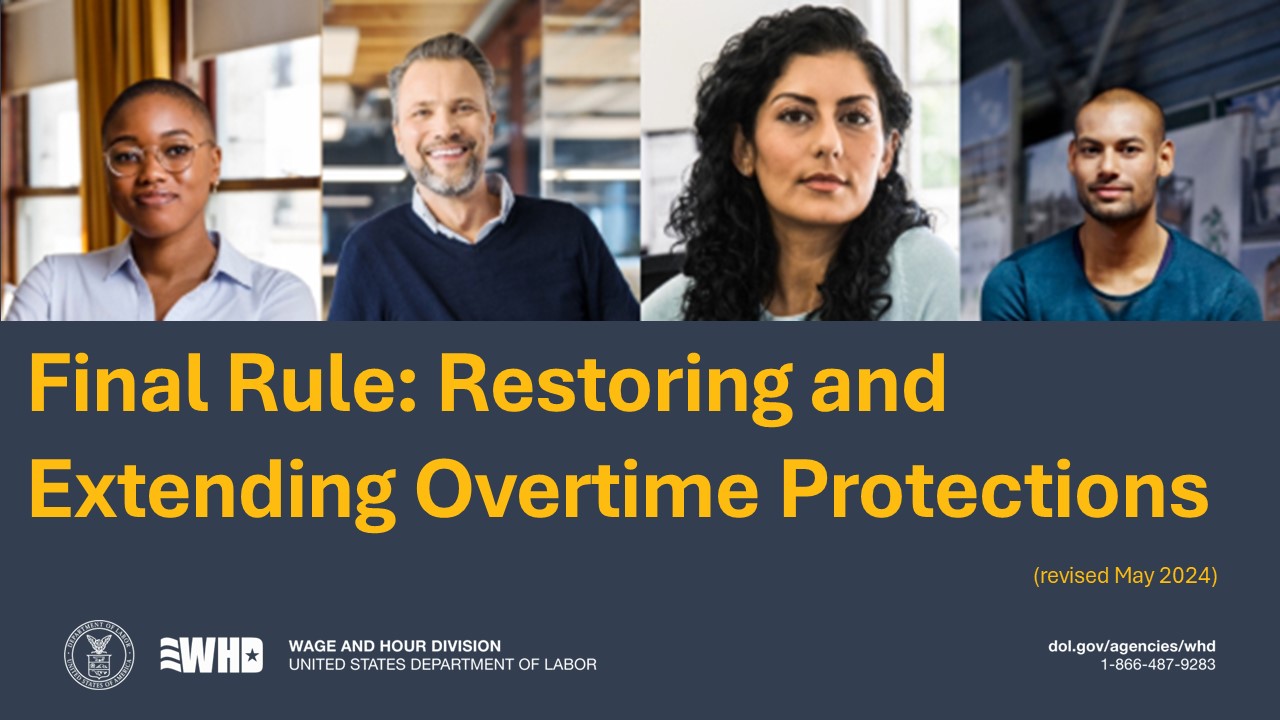NOTICE: On April 23, 2024, the U.S. Department of Labor (Department) announced a final rule, Defining and Delimiting the Exemptions for Executive, Administrative, Professional, Outside Sales, and Computer Employees , which will take effect on July 1, 2024. The final rule updates and revises the regulations issued under section 13(a)(1) of the Fair Labor Standards Act implementing the exemption from minimum wage and overtime pay requirements for executive, administrative, and professional (EAP) employees. Revisions include increases to the standard salary level and the highly compensated employee total annual compensation threshold, and a mechanism that provides for the timely and efficient updating of these earnings thresholds to reflect current earnings data.

Final Rule Webinar: Restoring and Extending Overtime Protections
This webinar provides a general overview of requirements under section 13(a)(1) of the FLSA, and will discuss the final rule's revisions, including scheduled increases to certain earnings thresholds required for exemption.

Regla Final: Restablecimiento y ampliación de la protección del sobretiempo
En este grupo de diapositivas le proporcionaremos una visión general de la Exención para Ejecutivos, Administrativos y Profesionales. A continuación, hablaremos de las fechas importantes de la Regla Final 2024, seguidas de los cambios realizados bajo esta Regla Final 2024, al nivel de salario estándar, el nivel de compensación anual total del empleado de alta compensación y el Mecanismo de Actualización.
Employees are exempt from the Fair Labor Standards Act’s minimum wage and overtime protections if they are employed in a bona fide executive, administrative, or professional capacity, as those terms are defined in the Department’s regulations at 29 CFR part 541 . To fall within the EAP exemption, an employee generally must meet three tests:
- be paid a salary, meaning that they are paid a predetermined and fixed amount that is not subject to reduction because of variations in the quality or quantity of work performed;
- be paid at least a specified weekly salary level; and
- primarily perform executive, administrative, or professional duties, as provided in the Department’s regulations.
The Department’s regulations also provide an alternative test for certain highly compensated employees who are paid a salary, earn above a higher total annual compensation level, and satisfy a minimal duties test.
The final rule will increase the standard salary level and the highly compensated employee total annual compensation threshold on the rule’s effective date on July 1, 2024, and on January 1, 2025, when changes in the methodologies used to calculate these levels become applicable. The final rule also provides for future updates of these levels every three years to reflect current earnings data. These scheduled increases are displayed below.
| DATE | STANDARD SALARY LEVEL | HIGHLY COMPENSATED EMPLOYEE TOTAL ANNUAL COMPENSATION THRESHOLD |
|---|---|---|
| Before July 1, 2024 | $684 per week (equivalent to $35,568 per year) | $107,432 per year, including at least $684 per week paid on a salary or fee basis. |
| July 1, 2024 | $844 per week (equivalent to $43,888 per year) | $132,964 per year, including at least $844 per week paid on a salary or fee basis. |
| January 1, 2025 | $1,128 per week (equivalent to $58,656 per year) | $151,164 per year, including at least $1,128 per week paid on a salary or fee basis. |
| July 1, 2027, and every 3 years thereafter | To be determined by applying to available data the methodology used to set the salary level in effect at the time of the update. | To be determined by applying to available data the methodology used to set the salary level in effect at the time of the update. |
View a comprehensive chart of all the earnings thresholds for EAP employees
Restaurar y ampliar las protecciones de horas extras
Additional Information
- Final Rule: Defining and Delimiting the Exemptions for Executive, Administrative, Professional, Outside Sales, and Computer Employees
- Press Release: Biden-Harris administration finalizes rule to increase compensation thresholds for overtime eligibility, expanding protections for millions of workers
- Frequently Asked Questions
- Small Entity Compliance Guide
- Proposed Rule: Defining and Delimiting the Exemptions for Executive, Administrative, Professional, Outside Sales, and Computer Employees
